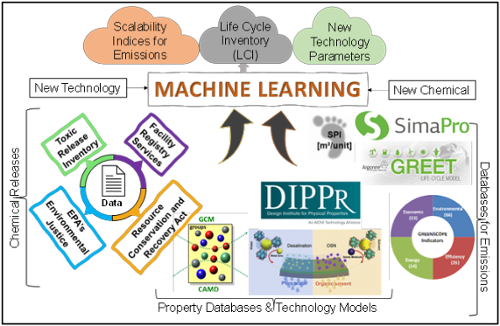Yenkie EPA
Yenkie EPA
Rowan University Chemical Engineering team receives funding from the US EPA Bipartisan Infrastructure Law program for Pollution Prevention
The research team in the Department of Chemical Engineering at Rowan University involving Dr. Kirti Yenkie (PI), Dr. Robert Hesketh (Co-PI), Dr. C. Stewart Slater (Co-I), and Dr. Mariano Savelski (Co-I) have been selected by the US EPA Bipartisan Infrastructure Law funding program for one of its Pollution Prevention (P2) grants that amounts to $314,416 for a two-year term.
Their project intends to advance the state of knowledge in sustainable chemical design through the development of novel machine learning (ML) approaches for the estimation of life cycle inventories, scalability factors for environmental emissions, and physiochemical and operating parameters for low-energy consuming separation technologies that will assist in the evaluation of alternative and safer chemicals, solvents, and greener technologies during early stages of process design. Currently, access to such data for novel chemicals such as bio-based solvents, safer solvents, alternative chemicals, and APIs can be very difficult since there is very little to no information available in the literature. However, these chemical properties as well as the environmental sustainability metrics are required to accurately determine if the novel alternative chemicals can provide an eco-friendly and safer substitute for more commonly used chemicals. Experimentations or large-scale molecular simulations can be time-consuming and can deter small facilities with production time and capacity constraints to consider these as Pollution Prevention (P2) alternatives.
Thus, this Rowan team plans to integrate machine learning approaches with traditional process synthesis and modeling methods to find missing information for novel chemicals such as their chemical properties, structure, composition as well as their environmental and sustainability metrics. This method will allow the plant design engineers and regulatory authorities to save time and money by quickly assessing which alternative new chemicals are suitable for substitution as well as sustainable over their life cycle. The team believes that such ML approaches can be expanded to chemical, pharmaceutical, and allied industries for sustainable and greener process design. This project will be accomplished by the unique student-faculty-industry-government partnerships through Rowan University’s Engineering Clinics, M.S., and Ph.D. programs.
See the official US EPA announcement here: https://www.epa.gov/newsreleases/rowan-university-glassboro-nj-receive-nearly-315000-bipartisan-infrastructure-law
